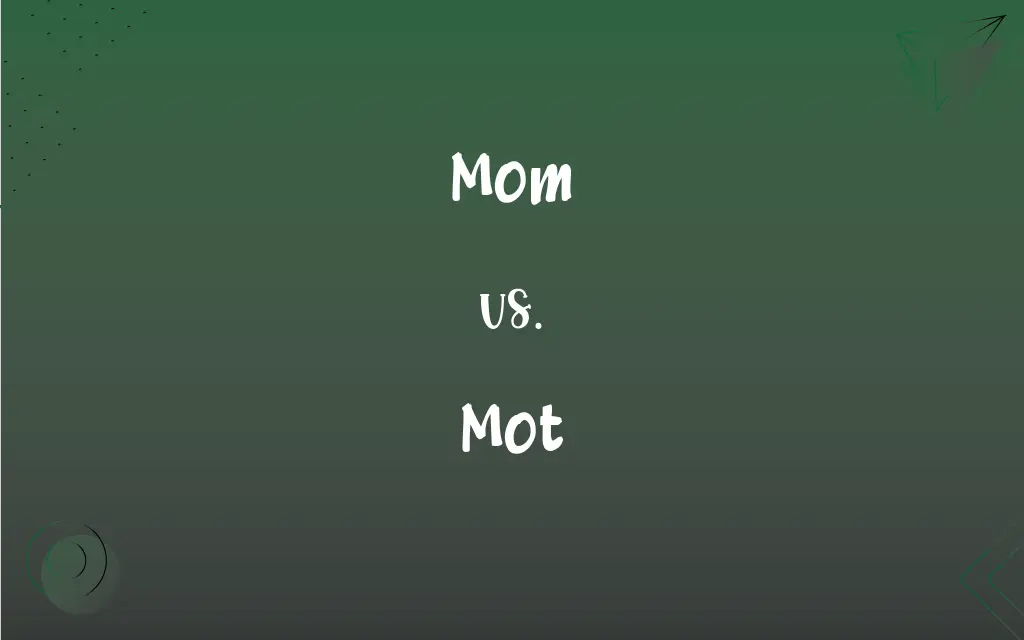Mom vs. Mot: What's the Difference?
By Aimie Carlson & Janet White || Updated on May 29, 2024
Mom is an informal term for mother, commonly used in American English to refer to one's female parent. Mot is a concise, witty remark or a clever saying.

Key Differences
Mom is a familiar, affectionate term for mother, widely used in American English to address or refer to one's female parent. It emphasizes the personal and familial relationship between a child and their mother and is typically used in everyday conversations and informal contexts. Mot, on the other hand, is a term borrowed from French, meaning a short, witty remark or clever saying. Often used in literary or intellectual contexts, a mot highlights the sharpness and brevity of a clever statement. It is associated with wit and sophistication in conversation or writing.
While mom focuses on familial bonds and is deeply personal, mot pertains to the intellectual domain, showcasing linguistic skill and humor. Mom is universally understood in familial contexts, whereas mot is more niche, often recognized by those familiar with literary or cultural references.
Mom is an everyday term reflecting warmth and affection, whereas mot is used to describe pithy, often humorous expressions, demonstrating verbal dexterity.
Comparison Chart
Definition
Informal term for mother
A short, witty remark or clever saying
Usage Context
Familial, informal
Literary, intellectual, conversational
ADVERTISEMENT
Language Origin
American English
French
Connotation
Warmth, affection
Wit, sophistication
Common Fields
Family, everyday conversation
Literature, culture, intellectual discourse
Emotional Tone
Personal, affectionate
Clever, humorous
Mom and Mot Definitions
Mom
Common in everyday conversation and informal contexts.
We had a family dinner, and mom cooked our favorite meal.
ADVERTISEMENT
Mot
A concise, witty remark or clever saying.
His speech was full of memorable mots that had the audience laughing.
Mom
Used to address one's mother directly.
Mom, can you help me with my homework?
Mot
Often used to describe a pithy or epigrammatic statement.
Oscar Wilde was famous for his sharp mots.
Mom
Informal term for mother, often used in American English.
I called my mom to wish her a happy birthday.
Mot
Reflects linguistic skill and humor.
Her mot about the situation was both insightful and funny.
Mom
Reflects a close, familial relationship.
My mom and I have a very special bond.
Mot
Associated with literary and intellectual contexts.
The book is filled with witty mots that keep the reader entertained.
Mom
A term of endearment for one's female parent.
Mom always knows how to make me feel better.
Mot
A term borrowed from French, meaning "word" or "phrase."
She ended her letter with a clever mot that encapsulated her thoughts.
Mom
Mother.
Mot
A witty or incisive remark.
Mom
Mother.
Mot
A witty remark; a witticism; a bon mot.
Mom
(informal) An adult female owner of a pet.
Mot
(obsolete) A word or a motto; a device.
Mom
To care for in a motherly way.
Mot
(obsolete) A note or brief strain on a bugle.
Mom
Informal terms for a mother
Mot
A woman; a wife.
Mot
A landlady.
Mot
May; must; might.
He moot as well say one word as another
The wordes mote be cousin to the deed.
Men moot [i.e., one only] give silver to the poore freres.
Mot
A word; hence, a motto; a device.
Tarquin's eye may read the mot afar.
Mot
A pithy or witty saying; a witticism.
Here and there turns up a . . . savage mot.
Mot
A note or brief strain on a bugle.
Mot
A clever remark
Mot
A compulsory annual test of older motor vehicles for safety and exhaust fumes
FAQs
What does "mot" mean?
Mot is a term meaning a short, witty remark or clever saying.
What does "mom" mean?
Mom is an informal term for mother, commonly used in American English to refer to one's female parent.
Is "mom" a formal term?
No, mom is an informal term used to address or refer to one's mother.
What context is "mot" used in?
Mot is used in literary, intellectual, and conversational contexts to highlight wit and cleverness.
Is "mot" widely understood?
Mot is more niche and may be recognized by those familiar with literary or cultural references.
What is the origin of "mot"?
Mot is derived from French, where it means "word."
Where is the term "mom" commonly used?
The term mom is widely used in American English and is common in everyday conversation.
Is "mot" related to humor?
Yes, mot often implies a witty or humorous remark.
Is "mom" specific to any region?
Mom is especially common in American English but understood in other English-speaking regions.
Does "mom" imply a specific relationship?
Yes, mom specifically refers to the relationship between a child and their female parent.
How is "mom" used in a sentence?
E.g., My mom always makes the best cookies.
Is "mot" formal or informal?
Mot is generally used in more formal or intellectual contexts but can appear in informal conversation to show wit.
Are there synonyms for "mot"?
Yes, synonyms for mot include witticism, quip, and epigram.
Can "mom" be used in written communication?
Yes, mom is commonly used in informal written communication, such as texts, emails, and personal notes.
What emotional tone does "mom" convey?
Mom conveys warmth, affection, and a close familial relationship.
Are there synonyms for "mom"?
Yes, synonyms for mom include mother, mama, mum, and mommy.
How does "mom" differ from "mother"?
Mom is informal and affectionate, while mother is more formal and can be used in various contexts beyond the personal, such as legal or official documents.
What is an example of a "mot"?
An example of a mot is Oscar Wilde's famous quote, "I can resist everything except temptation."
How is "mot" used in a sentence?
E.g., Her mot about life was both profound and humorous.
Can "mot" be used in everyday conversation?
Yes, mot can be used in everyday conversation, especially in contexts that appreciate wit and cleverness.
About Author
Written by
Aimie CarlsonAimie Carlson, holding a master's degree in English literature, is a fervent English language enthusiast. She lends her writing talents to Difference Wiki, a prominent website that specializes in comparisons, offering readers insightful analyses that both captivate and inform.
Co-written by
Janet WhiteJanet White has been an esteemed writer and blogger for Difference Wiki. Holding a Master's degree in Science and Medical Journalism from the prestigious Boston University, she has consistently demonstrated her expertise and passion for her field. When she's not immersed in her work, Janet relishes her time exercising, delving into a good book, and cherishing moments with friends and family.































































